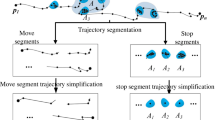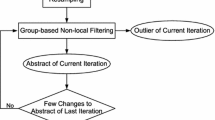Abstract
Trajectory data plays crucial role in many real-world applications with moving objects. The size of trajectory dataset is always very huge because of high sampling rate. Therefore, it is desired to simplify each trajectory before it is stored and processed. As the result, many trajectory simplification notions have been proposed. However, existing studies on trajectory simplification more or less rely on geometric-preserving manner (e.g., minimizing position-based or direction-based errors). These manners directly avoid effectiveness of velocity in many real-world applications. Actually, the velocity of a moving object is very important in many real-world applications, such as map-matching, mobility prediction, moving pattern mining, etc. In this paper, we propose a novel trajectory simplification, velocity-preserving trajectory simplification (VPTS), which minimize both geometric error and velocity error. We present an efficient algorithm for optimal velocity-preserving trajectory simplification. Through a series of experimental evaluation with real trajectory data, we examine the benefit of our proposed velocity-preserving trajectory simplification.
Access this chapter
Tax calculation will be finalised at checkout
Purchases are for personal use only
Similar content being viewed by others
References
Cao, H., Wolfson, O., Trajcevski, G.: Spatio-temporal data reduction with deterministic error bounds. VLDB J. 15(3), 211–228 (2006)
Chen, M., Xu, M., Fränti, P.: A fast o(n) multiresolution polygonal approximation algorithm for GPS trajectory simplification. IEEE Trans. Image Process. 21(5), 2770–2785 (2012)
Chen, Y., Jiang, K., Zheng, Y., Li, C., Yu, N.: Trajectory simplification method for location-based social networking services. In: Proceedings of the 2009 International Workshop on Location Based Social Networks, pp. 33–40. ACM (2009)
Long, C., Wong, R.C.-W., Jagadish, H.V.: Trajectory simplification: On minimizing the direction-based error. In: The 41st International Conference on Very Large Data Bases (VLDB 2015), Kohala Coast, Hawaii, USA, 31 August-4 September 2015 (2015)
Long, C., Wong, R.C.-W., Jagadish, H.V.: Direction-preserving trajectory simplification. In: The 39th International Conference on Very Large Data Bases (VLDB 2013), Riva del Garda, Trento, Italy, 26-30 August 2013 (2013)
Douglas, D., Peucker, T.: Algorithms for the reduction of the number of points required to represent a digitized line or its caricature. Can. Cartographer 11(2), 112–122 (1973)
Kellaris, G., Pelekis, N., Theodoridis, Y.: Map-matched trajectory compression. J. Syst. Softw. 86, 1566–1579 (2013)
Kolesnikov, A.: Efficient online algorithms for the polygonal approximation of trajectory data. In: MDM 2011, pp. 49–57 (2011)
Lan, K.-C., Chou, C.-M.: Realistic mobility models for vehicular ad hoc network (VANET) simulations. In: IEEE ICST 2008, October 2008
Lange, R., Farrell, T., Durr, F., Rothermel, K.: Remote real-time trajectory simplification. In: PerComm 2009, pp. 1–10 (2009)
Meratnia, N., de By, R.: Spatiotemporal compression techniques for moving point objects. In: Bertino, E., Christodoulakis, S., Plexousakis, D., Christophides, V., Koubarakis, M., Böhm, K. (eds.) EDBT 2004. LNCS, vol. 2992, pp. 765–782. Springer, Heidelberg (2004)
Muckell, J., Hwang, J.H., Patil, V., Lawson, C.T., Ping, F., Ravi, S.: Squish: an online approach for gps trajectory compression. In: COM.Geo 2011, pp. 13:1–13:8 (2011)
Patel, D., Sheng, C., Hsu, W., Lee, M.L.: Incorporating duration information for trajectory classification. In: ICDE 2012, pp. 1132–1143 (2012)
Potamias, M., Patroumpas, K., Sellis, T.: Sampling trajectory streams with spatiotemporal criteria. In: SSDBM 2006, pp. 275–284 (2006)
Singh, M., Zhu, Q., Jagadish, H.: Swst: A disk based index for sliding window spatio-temporal data. In: ICDE 2012, pp. 342–353 (2012)
SUVnet-Trace data: http://wirelesslab.sjtu.edu.cn
Acknowledgement
This research was partially supported by Ministry of Science and Technology, Taiwan, R.O.C. under grant no. MOST 104-2632-S-424-001 and MOST 104-2221-E-230-019.
Author information
Authors and Affiliations
Corresponding author
Editor information
Editors and Affiliations
Rights and permissions
Copyright information
© 2016 Springer-Verlag Berlin Heidelberg
About this paper
Cite this paper
Ying, J.JC., Su, JH. (2016). On Velocity-Preserving Trajectory Simplification. In: Nguyen, N.T., Trawiński, B., Fujita, H., Hong, TP. (eds) Intelligent Information and Database Systems. ACIIDS 2016. Lecture Notes in Computer Science(), vol 9622. Springer, Berlin, Heidelberg. https://doi.org/10.1007/978-3-662-49390-8_23
Download citation
DOI: https://doi.org/10.1007/978-3-662-49390-8_23
Publisher Name: Springer, Berlin, Heidelberg
Print ISBN: 978-3-662-49389-2
Online ISBN: 978-3-662-49390-8
eBook Packages: Computer ScienceComputer Science (R0)




